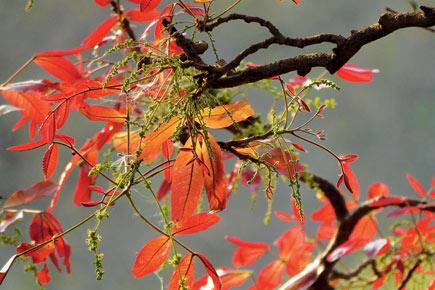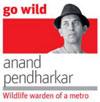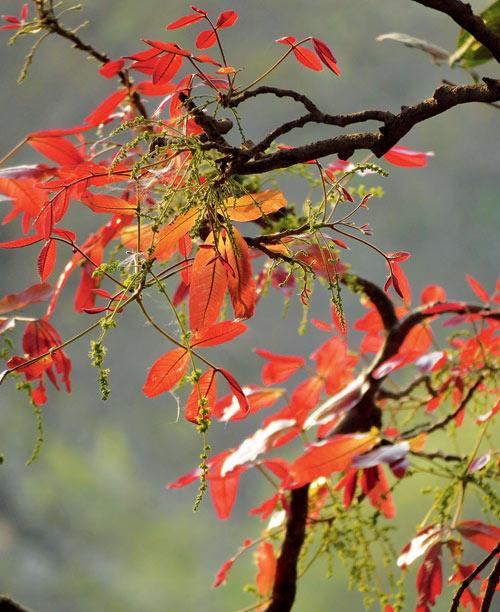AS part of our eco-leadership training, we encourage our interns to read books. Generally, they don’t need to go to libraries to borrow books as I have over 5,000 of them.

Young leaves in the deciduous kusum tree
 AS part of our eco-leadership training, we encourage our interns to read books. Generally, they don’t need to go to libraries to borrow books as I have over 5,000 of them. The subjects vary from the obvious nature, wildlife and photography to pure literature and fiction, education, adventure sports and even a few titles covering fashion, design, architecture, heritage, food, films and other interests such as art, gardening, music, travel and social or gender issues. These books live in my bedroom or hide behind doors, line my corridors, sit stoic in racks in my living room. In short, they are stacked all over the house, in places where I eat, sleep, work or read. So, literally, in my house, one is never more than an arm’s lengths distance from a book. The sad fact that these could’ve been forest trees at some point conflicts me immensely. But for me reading is about venturing into unknown worlds.
AS part of our eco-leadership training, we encourage our interns to read books. Generally, they don’t need to go to libraries to borrow books as I have over 5,000 of them. The subjects vary from the obvious nature, wildlife and photography to pure literature and fiction, education, adventure sports and even a few titles covering fashion, design, architecture, heritage, food, films and other interests such as art, gardening, music, travel and social or gender issues. These books live in my bedroom or hide behind doors, line my corridors, sit stoic in racks in my living room. In short, they are stacked all over the house, in places where I eat, sleep, work or read. So, literally, in my house, one is never more than an arm’s lengths distance from a book. The sad fact that these could’ve been forest trees at some point conflicts me immensely. But for me reading is about venturing into unknown worlds.
ADVERTISEMENT

Young leaves in the deciduous kusum tree
Obviously, I was excited when Amruta Padgaonkar, a young first-year undergraduate, picked up Rachel Carson’s 1972 epic Silent Spring to read. After she had covered some 30 or 40 pages, I gave into my curiosity and asked Amruta and Aradhya Sardesai (another intern) whether we experienced spring in our city. Aradhya was reading a book about the illegal ivory trade in Africa, and the question made him inquisitive. He promptly responded that Google and social networking sites had recently informed him that India experienced its first spring day just last week. Before getting into the argument regarding Mumbai’s spring season, we discussed how Carson was a visionary and how this classic sheds light on the disastrous consequences of dichloro diphenyl trichloroethane, commonly known as DDT, on all elements in nature. The book reinforces the eventuality that DDT will end up in our guts and our infant’s milk via the food cycle. Remember, the famous adage — a pesticide doesn’t know when to stop killing.
Keeping aside the morbidity of chemical and pesticides, I began exploring the poetic, colourful and bountiful spring season or Vasant Rutu as it is called in Hindi. A pair of crows has built a lovely nest on the Vilayati Badam tree across my window. And I observed that the resident squirrel has shifted its base to a few trees away. There are at least four female koels sitting, observing the crow’s nest and an occasional male koel visits to inspect the prospects too. I’m sure you all know of their klepto-parasitic habit, whereby they sneakily slip their eggs into the crow’s nest, for foster
parenting, which I will cover in a future column.
Currently, I’ve observed drastic changes in the trees in my colony, in the forests of the SGNP and in the hills of Tungareshwar. Many deciduous trees such as the mahua, kusum, kakad, amaltash and palash are all sporting young leaves on their barren branches. Last Sunday, while attending the 1st anniversary of the Cycle Katta at the MNPS (Dharavi), I saw lush pink leaves on the peepul there. The Rain Tree, Indian Laburnum, Copperpod and Flame of the forest are in bloom showcasing beautiful shades of red, pink and yellow. Insects such as bees and ants go searching for nectar around these blossoms. The newly emerging butterflies also add to this riot of colours. Right here in Andheri, the magpie robins, fantails and sunbirds are displaying their breeding plumage and chasing each other in a frenzied dance and song expressing their spring joy.
Our human kids are equally excited about festivities of Holi, Lohri, Bihu, Easter and Gudhi Padhwa, which are harvest festivals falling between mid-February to early-April. Soon, there will be plenty of mangoes, jackfruits and karwandas to feast on. While spring for the birds and the bees is the season of courtship and mating, we humans hack and burn good trees, waste water, splash hazardous chemical colours and misbehave with each other. If we resolve, it is possible for Mumbaikars to live in a parallel world of flora and fauna and wake up to the pleasant sound of chirping birds and enjoy the poetry that is spring.
Write in to Anand at sproutsenvttrust@gmail.com
 Subscribe today by clicking the link and stay updated with the latest news!" Click here!
Subscribe today by clicking the link and stay updated with the latest news!" Click here!






